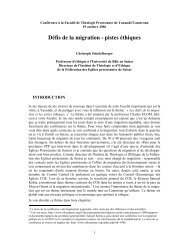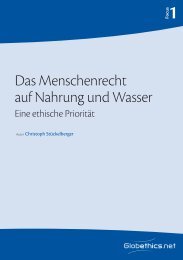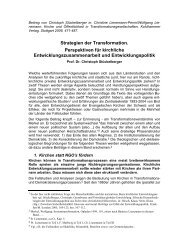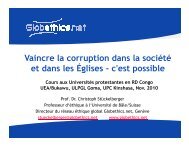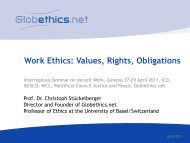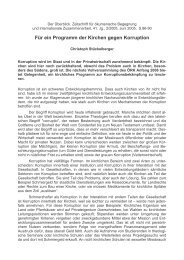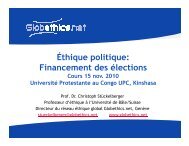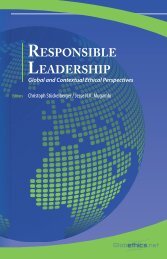BREAK THE CHAINS OF OPPRESION AND THE YOKE OF ...
BREAK THE CHAINS OF OPPRESION AND THE YOKE OF ...
BREAK THE CHAINS OF OPPRESION AND THE YOKE OF ...
Create successful ePaper yourself
Turn your PDF publications into a flip-book with our unique Google optimized e-Paper software.
gry and those now first finding themselves last (Mt. 10.30; Mk 10.31). In encountering<br />
biblical warnings about the consequences of failing to love and deal<br />
justly with those in need, it is hard to escape the conclusion that in continuing to<br />
emit carbon at rates that threaten our neighbours, present and future, human<br />
and other than human, we are bringing God’s judgement upon us. Even here we<br />
should not despair: that God judges rather than abandons us is a sign of God’s<br />
grace and continuing love for us. But in our encounter with God’s word in the<br />
context of climate change we should be clear that, while we have grounds for<br />
hope in the future God will bring if we act in accordance with God’s love for all<br />
creation, we also have grounds for fear of God’s judgement if we continue to fail<br />
to respond to the urgent needs of our neighbours. When the rich man, who had<br />
ignored Lazarus begging at his gate, asked to be allowed out of hell to warn his<br />
brothers, Abraham replied they already had Moses and the prophets (Lk.<br />
16.27–8). Neither can we say we have not heard.<br />
III Responding to God’s Word<br />
Confession<br />
In encountering God’s word in the context of climate change we have received a<br />
vision of hope in God’s faithfulness to creation, a call to practise love and justice<br />
to our neighbours, and a warning of God’s judgement of those who fail to do so.<br />
In response our first action must be confession: acknowledging what we have<br />
done wrong is the first and necessary step towards the change of direction repentance<br />
requires. We must confess that we:<br />
– are heirs to the riches of an industrialized economy that has been instrumental<br />
in causing � �the climatic � change already � �placing<br />
our neighbours in<br />
peril;<br />
FuturE – are so addicted to the fruits of this economy that we find it hard even to<br />
want to live lives that do not threaten the future of life on planet earth; and<br />
– know much of the good we should do to live within sustainable boundaries,<br />
but struggle to summon the moral will to change.<br />
Our wrongdoing is best understood as complicity in structural sin, a socially embedded<br />
and continuing pattern where the rich and powerful exploit those who<br />
are poor and powerless, just as they did in the days of the prophets.<br />
South African theologian, Ernst Conradie, has argued that the need for white<br />
South Africans to confess their involvement in the structures of apartheid is a<br />
good analogy for the confession necessary in relation to climate change. 22 Just as<br />
most white South Africans had no direct responsibility for the establishment or<br />
22 Ernst Conradie, The Church and Climate Change (Pietermaritzburg: Cluster Publications,<br />
2008).<br />
��������������������������������������������<br />
� � � � ��������������������<br />
�<br />
– HOPE IN GOD’S FUTURE – 159



